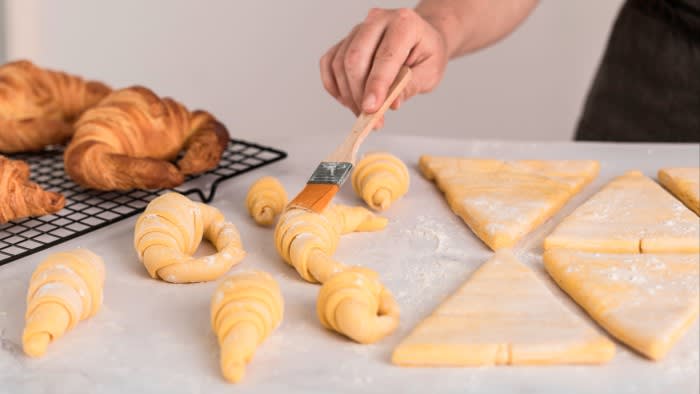Frozen croissants are on the rise as unwitting coffee shop customers eat record volumes of pre-made goods, accelerating the displacement of freshly-produced alternatives even in the pastry heartland of France.
Jordi Gallés of Europastry, one of the world’s top makers of frozen baked goods, said his croissants were making inroads in cafés across the US and western Europe — and that consumers could not distinguish them from a product made from scratch on site.
“In a blind test you can’t tell which is which,” said Gallés, Europastry’s executive chair and the son of its founder, in an interview with the Financial Times. “That’s the key to what we do: replicating the quality of a fresh product in a frozen product.”
The march of “industrial” croissants is the latest example of small-scale artisanal crafts being squeezed out by mass production to improve cost efficiency and cope with shortages of specialised labour — in this case bakers.
Barcelona-based Europastry, which is majority-owned by the Gallés family, has more than doubled its sales in the past seven years, logging revenue of €1.35bn in 2023. It is planning to float on the stock market with a valuation that analysts predict could be as high as €1.8bn.
Clients include Starbucks in several countries, Pret A Manger in the US, and the Spanish chain Manolo Bakes, which is famed for its mini croissants, according to industry executives.
“If you think of any iconic chain, French, English, or Spanish, all of them, to a greater or lesser extent, use frozen products,” Gallés said.
But as many coffee shops cultivate an aromatic atmosphere of freshly made bread and pastries, they are reluctant to advertise their backroom reliance on Europastry and rivals such as French groups Délifrance and Bridor.
“I wouldn’t talk about a hidden role,” said Gallés. “We are part of our customers’ formula. A lot of times they are shy about it mostly because they don’t want the competition to know how they do it.”
In France, frozen products accounted for 24 per cent of all pastries and other sweet baked goods in 2021. In the UK 21 per cent of pastries were frozen, compared with 13 per cent in Spain and 17 per cent in the US, according to research groups Gira and Global Market Insights.
Industry researchers have predicted that sales of frozen baked goods, including both bread and pastries, would grow by 7 per cent a year from 2021-26. They said the baked goods market overall, comprising both fresh and frozen food, would expand by just 1-2 per cent a year.
Europastry has 27 highly-automated factories across seven countries and is currently ramping up brioche bread production outside Madrid while building a new cookie production line in the Netherlands.
It churns out nearly 5,000 different products, including croissants made with generous dollops of French butter and loyalty to Gallic recipes said Gallés, 52, who studied at the HEC business school near Paris. “We respect tradition. There are no shortcuts.”
The raw croissants are then flash frozen — a process that takes no more than 30 minutes — to limit the formation of ice crystals that can damage their cellular structure. Once delivered to coffee shops, they must be defrosted, then put in an oven for 15-20 minutes for baking.

The processes are “totally natural”, Gallés said. “We don’t use additives. To preserve food the only thing we use is the cold.”
In 2023 Spain accounted for 45 per cent of Europastry sales, with the rest of Europe contributing 33 per cent and 16 per cent coming from the US.
Asked about quality, he pointed to a report by French newspaper Le Parisien where a high-end pastry chef did a blind tasting and picked a baked from frozen croissant made by one of Europastry’s competitors as the top product out of three.
To the frozen food sceptics, he said: “Let them try the product and compare it qualitatively. In the end the proof is not in your own mindset but in reality.”
Noting that Parisians prize the freshly-baked crispiness of their croissants, he said frozen goods enabled cafés and bakeries to serve hot-from-the-oven products at all times — and avoid running short or overproducing.
Consumers wanted high quality “indulgences” and “they want them to be omnipresent, every hour of the day, and with a very broad range of options”, Gallés said.
He argued that frozen products enabled coffee shops and bakeries to specialise in making a few things from scratch while offering a galaxy of other options — including Europastry top sellers such as doughnuts, muffins, cookies and brioche — without requiring any extra expertise.
“We have customers who tell us ‘hey, because I have labour problems, it’s an advantage for me at the operational level if the product arrives finished’,” Gallés said.


